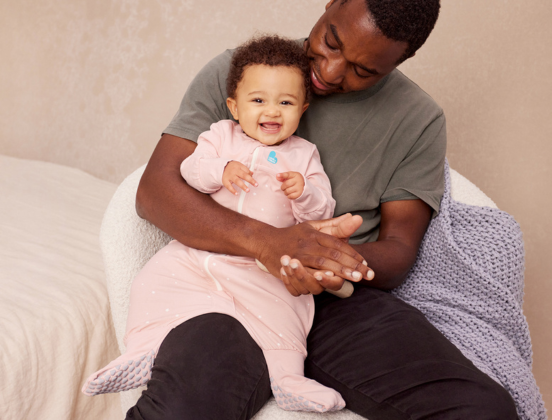Newborns get confused between day and night
A fun fact about babies is that newborns can’t tell the difference between day and night. Your baby has just come from a cozy home inside the womb, where frankly there were more pressing things to do! In fact, the internal mechanisms that allow your baby to differentiate day from night, don’t really develop until around 2 months of age. For the first months, your newborn’s main concerns are sleeping and eating. At this early stage, the time of day has little influence on your baby’s sleep cycles or body clock so don't be alarmed if you start needing to look for your own breakfast at 4am!
Baby sleep cycles are different to adults
Newborn sleep cycles are approximately 40 minutes long, whereas adult sleep cycles are around 90 minutes. Typically, adults have around 4-6 sleep cycles per night characterized by 4 different phases of sleep, whereas baby sleep is characterized by just 2 phases.
Babies transition from light sleep (REM) to deep sleep (NREM) around every 40 minute cycle. It’s during the light sleep phase that babies tend to wake up and may need help to resettle until they develop and learn to connect them themselves.

Dreamer Tip: Watch and learn the signs from your baby entering a deep sleep. If you were holding them, a deep sleep can be a more successful time to transfer them to their cot or bassinet.
Babies learn and grow as they sleep
There is so much information for your baby to absorb from the moment they arrive. When babies sleep, their brain is not only growing, but consolidating the information they’ve learned so far. It can be quite a profound moment when your baby appears to have ‘grown up’ while they were asleep.
Babies have a phase of light sleep known as REM (rapid eye movement). This stage is thought to help your baby’s brain develop by preventing it from resting. During the light sleep phase, blood flow to the brain increases and the body increases production of some nerve proteins that are known to promote brain activity.
Baby sleep matures with time
With the help of bedtime routines, baby sleep can mature quickly. At around 3 months, a baby’s sleep phases will extend from 2 to 3, and by the age of 6 months, your baby is capable of joining their brief sleep cycles together. Encouraging and supporting your baby to self-settle with a method that works for you is an important step towards evolving your baby’s sleep patterns.
Bedtime routines & rhythms
Bedtime routines can provide your little one with helpful sleep cues to understand what to expect each day. While bedtime routines may take some time to establish, it's the repetition and regularity that can help your baby begin to connect the dots of what to expect at bedtime.
Sleep time routines may be simple, but generally if they are performed regularly and in order, they can start to form an effective daily rhythm in your home and be a tool to encourage more predictable sleep. Bedtime routines can also help reinforce your baby’s circadian rhythms, help minimize disruption during sleep regressions and can help lessen the need for sleep aids over time.
Dreamer Tip: It's important to remember that some days, the routine will go out the window. This is completely normal and won't set you back, somedays you just have to go with babies flow.
Sleep regression is normal
After you’ve put in the hard yards to get your baby into a sleeping pattern that your household is comfortable with, something changes. Sleep regressions for often considered "sleep progressions" as they are usually related to developmental milestones but they can also be caused by illness, a change in routine or travel. Whatever the cause, they can be frustrating all the same.
Sleep regressions are characterized by:
- More frequent night waking
- Extra fussiness
- Resisting naps and difficulty falling asleep
Understanding that sleep regressions are a very natural part of your baby’s development can reduce the likelihood of you scratching your head, wondering what went wrong and when will it return to normal. The best course of action is stick to your bedtime routine (or it might be a good time to try one if you haven’t). Within the first year there are predictable developmental times your baby may experience a sleep regression. These are:
- 4 months
- 6 months
- 8-10 months
- 12 months
Dreamer Tip: It can help to loosely plan ahead with stocking your freezer with easy meals, calling in some support or just mentally prepping for some broken sleep ahead. Normalcy will be restored soon - hang in there!
Sleep deprivation is hard
Babies and sleep deprivation often go hand-in-hand. While we’ve all experienced what it’s like to miss out on a bit of sleep, the constant nature of tending to your baby on a 24-hour clock can take its toll, no matter how prepared you might think you are. Sleep deprivation can cause you to do some funny things, but it is a serious issue and should be treated as such.
Sleep deprivation left unchecked can leave you feeling depressed, cause memory lapses, have you feeling unable to cope and make day-to-day tasks a challenge. If you or your partner are suffering the effects of sleep deprivation, reach out to your doctor, or trusted family or friends for personalized support.
Postnatal depression can happen to anyone
Regardless of whether you’ve suffered from depression before, postnatal depression can happen to anyone. Postpartum hormones may cause extreme mood-swings and leave you feeling depleted or unable to cope. Perhaps the experience of childbirth or the early days of having a baby aren’t what you thought. Maybe you’re having trouble with feeding or things aren’t going according to plan. However you're feeling, be sure to seek support to validate your experience.
The life changes you go through after having a baby can be profound and also confronting both emotionally and physically. If you or your partner are feeling overwhelmed, there is plenty of support available and you shouldn’t hesitate to call on help whenever you need it. Talk to your Primary Care Physician, trusted family or friends for personalized support.








